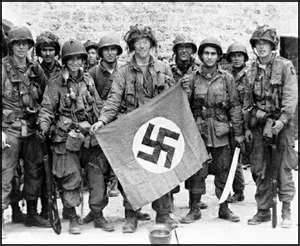 Today (6 June) is the day when veterans and dignitaries of the warring nations of WWII gather on the beaches of Normandy to give thanks, and to honour the fallen of 68 years ago. This week, tourists will fan out across the small seaport towns of northern France, inspect the displays, marvel at the remnants of concrete bunkers, and try to imagine the scene as it was back in 1944. The picture at the left shows some US paratroopers, happily displaying a captured flag. If anyone can identify the unit, please let me know.
Today (6 June) is the day when veterans and dignitaries of the warring nations of WWII gather on the beaches of Normandy to give thanks, and to honour the fallen of 68 years ago. This week, tourists will fan out across the small seaport towns of northern France, inspect the displays, marvel at the remnants of concrete bunkers, and try to imagine the scene as it was back in 1944. The picture at the left shows some US paratroopers, happily displaying a captured flag. If anyone can identify the unit, please let me know.
 If you are looking to skip the more substantial tomes (and there are many first-rate ones) and would prefer the quick-read pocketbook version: try Martin Gilbert’s D-Day (Wiley, 2004). Only 200 smallish pages.
If you are looking to skip the more substantial tomes (and there are many first-rate ones) and would prefer the quick-read pocketbook version: try Martin Gilbert’s D-Day (Wiley, 2004). Only 200 smallish pages.
Despite Gilbert’s status as academic historian and Churchill biographer, the book has an easygoing style and is full of entertaining anecdotes. Utah, Omaha, Gold, Juno, and Sword were the code names of the famous beaches of Operation Overlord. Mulberry was the code name for the artificial harbour, created from pre-fabricated jetties that were towed across the English Channel. Astonishingly, the two American beaches (Utah and Omaha), and Overlord, and Mulberry, were discovered to be answers to crossword puzzles published a few weeks earlier in the London Daily Telegraph. A monumental breach in security?
Apparently not. Gilbert relates how the designer of the crosswords was questioned by MI5 and the whole affair put down to coincidence.
